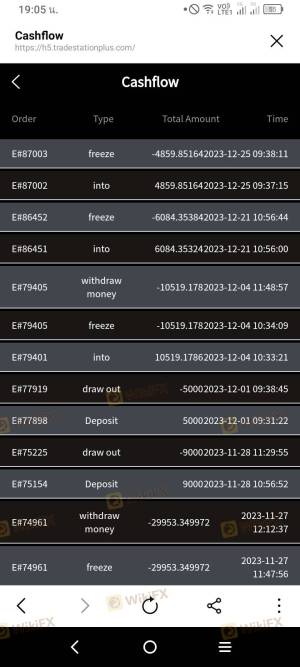Is TradeStation safe?

Business

License

Is TradeStation A Scam?
Introduction
TradeStation is an established online brokerage firm that has carved a niche for itself in the financial markets, particularly catering to active traders and investors. Founded in 1982 as Omega Research, it has evolved into a sophisticated trading platform that offers a wide array of financial instruments, including stocks, options, futures, and cryptocurrencies. As with any brokerage, it is imperative for traders to exercise caution and conduct thorough due diligence before engaging with TradeStation or any other trading platform. The stakes are high in trading, and the consequences of choosing an unreliable broker can be severe, ranging from financial loss to potential fraud. This article aims to provide a comprehensive analysis of TradeStation's legitimacy by examining its regulatory status, company background, trading conditions, customer safety measures, and user experiences. The evaluation is based on a review of multiple credible sources, including regulatory filings, user testimonials, and industry analyses.
Regulation and Legitimacy
One of the foremost indicators of a brokerage's reliability is its regulatory status. TradeStation operates under the oversight of several top-tier regulatory bodies, which is crucial for ensuring the safety of client funds and maintaining industry standards. Below is a table summarizing the key regulatory information concerning TradeStation:
| Regulatory Authority | License Number | Regulatory Region | Verification Status |
|---|---|---|---|
| SEC | 8-48711 | United States | Verified |
| FINRA | CRD #39473 | United States | Verified |
| CFTC | NFA ID 0307871 | United States | Verified |
| FCA | 445531 | United Kingdom | Verified |
TradeStation is regulated by the Securities and Exchange Commission (SEC) and is a member of the Financial Industry Regulatory Authority (FINRA), both of which are stringent regulators in the United States. Additionally, it is registered with the Commodity Futures Trading Commission (CFTC) and the National Futures Association (NFA). The presence of these regulatory bodies indicates that TradeStation adheres to strict operational guidelines designed to protect investors. Historical compliance records show that TradeStation has not faced significant regulatory sanctions, which further supports its standing as a legitimate brokerage.
Company Background Investigation
TradeStation's history dates back to its inception in 1982, when it was founded by brothers William and Rafael Cruz. Initially focused on developing advanced trading software, TradeStation transitioned into a full-service brokerage in 2001. The company was acquired by Monex Group, a major Japanese online financial services firm, in 2011, which has further solidified its market position. The management team comprises experienced professionals with backgrounds in finance and technology, enhancing the firm's credibility and operational expertise.
Transparency is a critical factor in evaluating a brokerage's reliability. TradeStation maintains a high level of transparency regarding its operations, including clear disclosures about fees, trading conditions, and regulatory compliance. Investors can access detailed information about the company's financial standing and operational metrics through its website and annual reports. This level of openness is essential for building trust with clients and demonstrates TradeStation's commitment to ethical business practices.
Trading Conditions Analysis
When it comes to trading conditions, TradeStation offers a competitive fee structure designed to appeal to active traders. The brokerage provides commission-free trading on stocks and exchange-traded funds (ETFs), which is a significant advantage. However, options and futures trading does incur fees, which can vary based on the specific trading plan chosen. Below is a table summarizing TradeStation's core trading costs compared to industry averages:
| Cost Type | TradeStation | Industry Average |
|---|---|---|
| Major Currency Pair Spread | From 0.01 pips | From 0.5 pips |
| Commission Model | $0 for stocks/ETFs, $0.60 per option contract | $0.65 per contract |
| Overnight Interest Range | 3.5% - 12.5% | 3% - 10% |
While the commission-free trading on stocks and ETFs is attractive, the fees for options trading at $0.60 per contract are slightly higher than the industry average. Additionally, TradeStation has been criticized for its inactivity fee of $10 per month if certain trading activity thresholds are not met. This fee structure may deter casual investors who do not trade frequently.
Customer Funds Safety
The safety of customer funds is paramount when evaluating a brokerage. TradeStation employs several measures to ensure the security of client assets. Client funds are held in segregated accounts, separate from the company's operational funds, which is a critical safeguard against potential insolvency. Furthermore, TradeStation is a member of the Securities Investor Protection Corporation (SIPC), which provides coverage for securities and cash held in accounts up to $500,000, including $250,000 for cash claims.
Despite these protections, it is important to note that TradeStation's cryptocurrency division does not fall under SIPC coverage. This lack of protection for crypto assets has raised concerns among investors, especially given the volatility and risks associated with cryptocurrency trading. Historically, TradeStation has maintained a clean record regarding fund safety, with no significant incidents of fraud or mismanagement reported.
Customer Experience and Complaints
Customer feedback is a valuable resource for assessing a brokerage's performance. TradeStation has received mixed reviews from users, with many praising its advanced trading tools and platforms, while others have expressed dissatisfaction with customer service and fee structures. Common complaints include issues with account verification, high withdrawal fees, and the complexity of the trading platform, which some users find overwhelming.
The table below summarizes the major complaint types and their severity:
| Complaint Type | Severity Level | Company Response |
|---|---|---|
| Customer Service Issues | High | Slow response times |
| Withdrawal Fees | Medium | Limited options available |
| Platform Complexity | Medium | User education offered |
| Inactivity Fees | Low | Fees outlined clearly |
A notable case involved a user who faced delays in fund withdrawals, leading to frustration and dissatisfaction. While TradeStation's customer support is available via phone, email, and live chat, response times have been reported as slow, particularly during peak trading hours.
Platform and Trade Execution
TradeStation is well-regarded for its robust trading platform, which offers a variety of features suited for both novice and experienced traders. The platform provides advanced charting tools, real-time data, and a customizable interface that allows users to tailor their trading experience. However, some users have reported issues with platform stability during high volatility periods, which can impact trade execution.
The quality of order execution is another critical aspect to consider. TradeStation generally provides good execution quality, with a reported fill rate of approximately 95.75%. However, instances of slippage have been noted, particularly during fast-moving markets, which can affect the final price at which trades are executed.
Risk Assessment
Using TradeStation comes with its own set of risks, primarily related to the complexity of the platform and the potential for high trading costs. The following risk assessment summarizes key risk areas:
| Risk Category | Risk Level (Low/Medium/High) | Brief Description |
|---|---|---|
| Platform Complexity | High | Steep learning curve for new users |
| Withdrawal Issues | Medium | Delays and fees can be frustrating |
| Market Volatility | High | Increased risk of slippage |
| No Negative Balance Protection | Medium | Risk of owing money if positions move against you |
To mitigate these risks, it is advisable for traders to familiarize themselves with the platform through demo accounts, utilize risk management strategies, and maintain adequate capital to cover potential losses.
Conclusion and Recommendations
In conclusion, TradeStation is not a scam; it is a legitimate brokerage with a long-standing history and a solid regulatory framework. However, traders should be aware of the associated risks and potential drawbacks, such as the complexity of the platform and the fee structure. While TradeStation excels in providing advanced tools for active traders, it may not be the best fit for casual investors or beginners.
For those considering TradeStation, it is recommended to start with a demo account to gain familiarity with the platform before committing real funds. Additionally, traders looking for alternatives may consider brokers like Charles Schwab or Fidelity, which offer more user-friendly platforms and a wider range of investment options, including fractional shares and no-transaction-fee mutual funds.
Is TradeStation a scam, or is it legit?
The latest exposure and evaluation content of TradeStation brokers.



TradeStation Similar Brokers Safe
Whether it is a legitimate broker to see if the market is regulated; start investing in Forex App whether it is safe or a scam, check whether there is a license.
TradeStation latest industry rating score is 1.58, the higher the score the safer it is out of 10, the more regulatory licenses the more legitimate it is. 1.58 If the score is too low, there is a risk of being scammed, please pay attention to the choice to avoid.